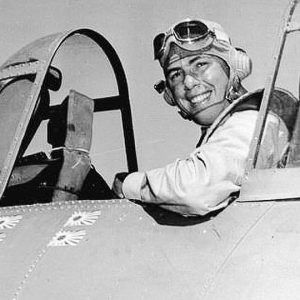calsfoundation@cals.org
Elbert Scott McCuskey (1915–1997)
Naval fighter ace Captain Elbert Scott McCuskey was one of the most highly decorated fighter pilots of World War II. Credited with 13.5 aerial victories in the Pacific Theater, he was awarded two Navy Crosses (the U.S. Navy’s second highest decoration for valor), as well as five Distinguished Flying Crosses and fourteen Air Medals.
Elbert Scott McCuskey was born in Little Rock (Pulaski County) on February 8, 1915, to Joseph Carl McCuskey and Rosamond James McCuskey. McCuskey’s father was a farmer near Stuttgart (Arkansas County) and died in 1933. Information on where McCuskey attended school in his youth is imprecise, but it is likely that he attended school in either Little Rock or Stuttgart.
His twenty-seven-year career in the U.S. Navy began in 1938, and he earned his wings and commission as an ensign in 1939. In late 1941, he was part of VF-42 on the carrier Yorktown, conducting patrols in the Atlantic Ocean to protect the merchant ships heading for Britain. After the attack on Pearl Harbor, Yorktown, with McCuskey’s squadron still aboard, was transferred to the Pacific. In February 1942, he was credited with his first aerial victory. In May 1942, he participated in the Battle of the Coral Sea, downing his second enemy aircraft. McCuskey earned his first Navy Cross for his heroism.
On June 4, 1942, during the Battle of Midway, a defining battle at sea during the war, McCuskey performed actions that earned his second Navy Cross. His citation notes that he “played a principal role in disrupting a bombing attack directed against the YORKTOWN by a formation of eighteen Japanese dive bombers accompanied by fighter escort. With three other friendly fighter planes, he intercepted the large enemy formation, and, in the face of their fire, personally shot down three enemy dive bombers, and damaged three others before he exhausted his ammunition. Later the same day, he engaged enemy fighters escorting a torpedo plane attack, pressing home his attacks so strenuously and skillfully as to bring about the destruction of two Japanese ‘Zero’ fighters.”
After the war, he received a master’s degree in economics from Georgetown University and a doctorate in economics from Nova University. He also earned a law degree from the University of Alabama but never practiced law. He taught at both the Naval War College and the Industrial College of the Armed Forces. He retired from the navy as a captain in 1965. He then moved to Clearwater, Florida, where he taught economics at St. Petersburg Junior College.
E. Scott McCuskey was inducted into the Arkansas Aviation Hall of Fame in 1989. He died of a heart attack, suffered while attending services at Peace Memorial Presbyterian Church in Clearwater, on June 15, 1997. He is buried at Barrancas National Cemetery at Naval Air Station Pensacola. The service for McCuskey included a naval aircraft flyover, an honor typically reserved for those who die while on active military duty but given here because he was one of the navy’s most highly decorated aviators.
For additional information:
Arkansas Aviation Historical Society. https:/www.arkavhs.com (accessed July 17, 2025).
“Elbert Scott McCuskey.” Hall of Valor, Military Times. https://valor.militarytimes.com/hero/21666/ (accessed July 17, 2025).
Elbert Scott McCuskey Oral History Interview. Museum of Flight. https://digitalcollections.museumofflight.org/nodes/view/7633 (accessed July 17, 2025).
Richard Holbert
Little Rock, Arkansas
 World War II through the Faubus Era, 1941 through 1967
World War II through the Faubus Era, 1941 through 1967 Scott McCuskey
Scott McCuskey 



Comments
No comments on this entry yet.